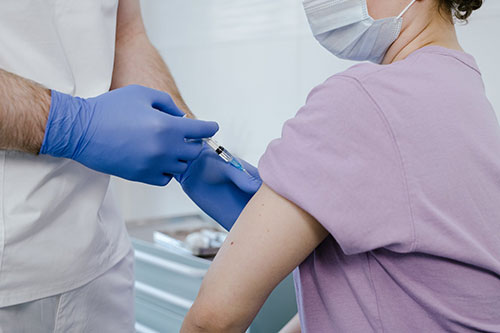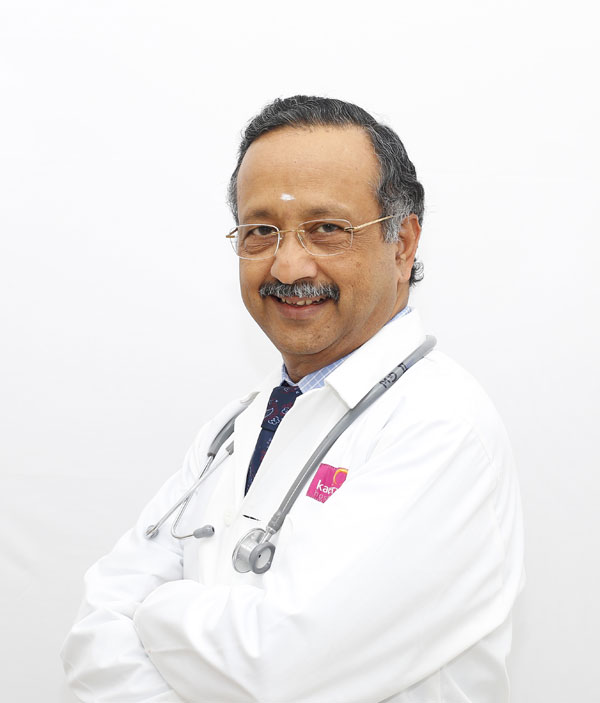Key Points:
- SARS CoV 2 causes clots in the blood by the process of immuno-thrombo-inflammation.
- It is an infection which causes thrombosis using the body’s own immunity in both the arteries and veins.
- Clots have been reported to affect the limbs, heart, brain, kidneys, and intestines in the body up to 45 days post-covid.
- Clots can be prevented by taking anticoagulation.
- The incidence of vaccine-induced clots is negligible (<0.0001%).
- Vaccine causing fatal clots due to low platelets affecting the veins in the brain is extremely rare.
- Patients on blood thinner medication should continue their medication during Covid-19 and vaccination.

SARS CoV -2 and Clots
We are in the declining phase of the 2nd wave of the Covid-19 pandemic. The SARS CoV-2 virus as on June 2021 has infected more than 3 crore people in our country and 8% of those are from Tamil Nadu. Last year, around this time (during the decline) we saw an increase in the number of complications related to Covid-19. The complications resulting from covid are numerous and deadly. A little less known and publicised complication in the community is thrombosis or simply put blood clots. Clots have recently made it into the headlines and everyone’s mind as a side effect of the vaccine. It has been well established since the first wave of the pandemic that there is a strong association between Covid-19 and clots even before the vaccine was available. There are very few viruses capable of causing blood clots in the human body, however the SARS CoV-2 has turned out to be one among them.
Recently the causative mechanism of thrombosis has been explained. The virus attaches to human tissue ACE 2 receptor which is widely present in the throat and lungs and also in the cells lining the blood vessels. SARS CoV-2 contrary to belief does not enter the blood directly but acts via an immune cross-reaction with the vessels and that is why blood donation and mosquitos cannot spread Covid-19. In simple terms it uses the body’s own immune system to cause an increase in the clotting tendency within the blood vessel. The inflammation present locally in the blood vessel incites clots to form leading to blockage of the blood vessels and ischaemia. Ischaemia is the end result where a part of the body tissue loses its blood supply and necrosis (dies).
The virus spreads in a step-wise fashion from the throat to the lungs and finally conjures up a cytokine storm of chemical mediators (commonly in moderate to severe cases of covid). Once the storm hits, the patient becomes severely prothrombotic with an increasing derangement in primary clotting mechanism. The blood becomes hypercoagulable leading to multiple small clots in the vessels which in medical parlance is called disseminated intravascular coagulation (DIC).
Arterial clots are seen in:
- Pulmonary arterial tree leading to low oxygen levels and breathlessness
- Upper and lower limbs – resulting in acute limb ischaemia- requires immediate treatment, delay can lead to amputation.
- Blood vessels in the heart – Myocardial infarction (heart attack) – 7-17% of hospitalised patients and 20% of ICU admissions with Covid-19.
- Blood vessels to the brain- Stroke – 5% in patients with Covid-19.
- A main blood vessel from the heart – Abdominal and thoracic aorta – thrombosis is usually partial and resolves with anticoagulation medication.
- Blood vessels to the intestines – Mesenteric ischaemia leading to gangrene of the intestine
Venous clots are seen on:
- Veins in the body- Can involve veins in the lower limbs, varicose veins, Intestinal veins and those in the brain. Rates of clots in the veins are 0.9% in the general population and 15-32% among ICU admissions with Covid-19. Clots in the lower limb veins can embolize to the lungs leading to deadly pulmonary embolism.
- Pulmonary embolism- seen in 25% of patients in the absence of anticoagulation. The blood vessels to the lungs are blocked leading to low Oxygen levels, which can be fatal.
Those patients with asymptomatic to mild Covid-19 disease are less prone to clotting but they also are not completely free from clots. Those with high D-Dimer values have been seen to develop clots despite not having any symptoms. Hence symptoms cannot define the presence of clots. Patients who have had a previous history of clots in the body have to be extra cautious during an episode of covid. Recurrence rates of thrombosis are high in this group of patients. Apart from patients who have a history of clots, those with risk factors such as acute respiratory illness, active infection, decreased mobility, senior citizens, cancer, obesity, pregnancy, heart disease and Diabetes have a higher chance of developing clots during Covid-19.
The problems associated with clots after covid can present acutely during or immediately after covid (up to 45 days) –
- Limbs- pain, altered sensation & cold skin.
- Heart attack- Chest pain, palpitations, and shortness of breath.
- Stroke -Facial deviation, slurred speech or weakness in one or more limbs.
- Intestinal ischemia – abdominal pain, bloody/ black stools.
- Venous clots – sudden swelling of limbs.
- Pulmonary embolism- breathlessness, cough and pink frothy sputum.
They have been reported to occur up to even 45 days from the time of covid. In our unit we have also seen patients who are asymptomatic presenting with clots initially and later turning positive for the SARS CoV-2. If any of the above symptoms are present after covid it is better to get it evaluated. As far as Covid-19 is concerned we must err on the side of caution rather than procrastinate visiting a doctor. Delay in treating these dreaded clots can lead to amputation and even death. On a less scary note, these clots are mostly preventable by anticoagulation.
How can we prevent these dreadful clots in Covid -19?
Incidence of clots in this wave of the pandemic has been brought down by effective anticoagulation as compared to the first wave. Anticoagulants are anticlotting medications used to prevent clots from being formed in the body. Prophylactic anticoagulants are prescribed to most patients with Covid-19 during this wave in the hope of preventing these clots. Moderate to severe cases get a more potent injectable anticoagulant. Even patients with a mild covid infection will need anticoagulation if the D-Dimer value is elevated. Even if clots do form doctors are equipped to remove these clots if patients present early. Once the tissue is damaged irreversibly by ischemia there is no point in removing these clots. Hence awareness and early presentation are key to treating these clots once they occur. The complications increase if treatment is postponed. 25% of patients with severe Covid-19 will develop pulmonary embolism and 3.7% of patients, arterial thrombosis in the absence of anticoagulation. Several guidelines for thromboprophylaxis and treatment have been drawn up from the experience of the first wave.
With most hospitals instituting an anticoagulation policy early on, we have been able to reduce the number of covid clot-related complications resulting even more so in the second wave. Hats off to our healthcare workers who were able to identify and administer effective anticoagulation in Covid-19 patients thus reducing the number of clots this time around.
Vaccine and clots
Vaccination has been plagued by the problem of clots. Clots have been reported after all the available vaccines. Unnecessary media hype and knee-jerk reaction by some European countries have created a state of vaccine hesitancy amongst the public. The incidence of clots after vaccination is extremely rare and the benefit of the vaccine far outweighs the risk of clots. Among the venous clots only a minuscule number of patients have developed fatal clots in the brain due to an allergic reaction affecting the platelets. More than 25 crore vaccine doses have been administered in India and the Government of India has reported less than one per million cases of clots by the Covishield vaccine which is lesser than the 4 per million reported in Europe.
The risk of clots on taking the Covid-19 vaccine is less than the chance of your getting in a road traffic accident on the way to vaccination. The risk of clots with the vaccine is only 0.0001%.
Patients who are already on blood thinners (Aspirin, Clopidogrel) need not stop the medicine prior to vaccination. Those who are on anti- clotting medicines (Acitrom, Warfarin, Dabigatran, Rivaroxaban, Apixaban) need to stop that for 2 days prior to the vaccine and can restart the medicines the same day of vaccination.
Let us all unite and get everyone vaccinated which is the surest way to eradicate this terrible Virus.

Dr. Sekar Natarajan
Chief Vascular and Endovascular Surgeon
Kauvery Hospital, Chennai

